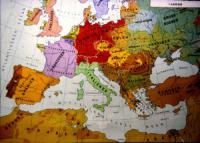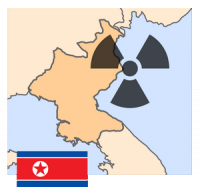-
China's Huawei sues U.S. government over ban

Chinese tech giant Huawei has sued the U.S. government, arguing that legislation Congress passed last year that restricts its business in the United States is “unconstitutional.” The case, which analysts see more as a public relations move, is but the latest in an intensifying effort by the telecommunications company to fight U.S. security concerns, which Huawei argues are unfair and unfounded.
-
-
Canada must not be naive when dealing with China’s authoritarian regime

A new book on Canada-China relations offers lessons for the United States. The book “is in many ways a primer on the central challenge of our era – the question of how democracies address the scope and depth of an authoritarian wave now picking up momentum,” writes Hugh Segal, a Canadian foreign policy expert. “Our engagement with China must set aside the temptations of presuming fair minded universal intent on the part of Chinese state-controlled instruments, economic, diplomatic or military. We must be more focused on the protection of our own security and freedoms from Chinese subversion. Countries that wish access to our resources, technology and investment on normative terms do not get to launch cyberattacks against us, from military and intelligence units controlled by the state.”
-
-
U.K.’s Equality Commission to investigate Labour Party over failure to counter anti-Semitism
In an explosive development, Britain’s Equality and Human Rights Commission (EHRC) announced Thursday that it had begun proceedings against the Labour Party over its failure to stamp out anti-Semitism in its ranks. The equality watchdog said it has reason to believe that Labour has “unlawfully discriminated against people because of their ethnicity and religious beliefs” over the party’s handling of anti-Semitism complaints.
-
-
The guises under which current anti-Semitism travels
Today’s anti-Semitism travels under many guises. In reviewing Deborah Lipstadt’s just-published Antisemitism: Here and Now, Bret Stephens, a conservative columnist at the New York Times, writes that the most important insight of Lipstadt’s analysis is “that the resurgence of anti-Semitism owes as much to its political enablers who aren’t openly bigoted as it does to its ideological practitioners who are — is the most valuable contribution the book makes to our discussion of modern-day Jew hatred.”
-
-
ISIS child suspects arbitrarily arrested, tortured by Iraqi, Kurdish govs.

Human Rights Watch estimates that Iraqi and Kurdish authorities are holding in detention approximately 1,500 children younger than 17 years of age for alleged ISIS affiliation. Many of these children, some as young as 11 years old, have been tortured. At least 185 foreign children have been convicted on terrorism charges and sentenced to prison terms, according to Iraqi government authorities.
-
-
U.K. unveils new counter-terrorism information sharing platform

A new multi-million pound project to share information with the private sector has been unveiled by the security minister. this joint initiative will see a ground breaking interactive online platform developed to provide secure expert advice and training to businesses and public sector organizations to help them develop their own counter-terrorism approaches.
-
-
White supremacist propaganda and events soared in 2018

White supremacists dramatically stepped up their propaganda efforts targeting neighborhoods and campuses in 2018, far exceeding any previous annual distribution count for the United States and showing how these extremist groups are finding ways to share hateful messages while hiding the identity of individual members.
-
-
European ethno-nationalist and white supremacist movements thrive

More than seventy years after the defeat of Nazi Germany, ethno-nationalist and white supremacist movements in Europe continue to thrive. They include far-right political parties, neo-Nazi movements, and apolitical protest groups. Some groups openly espouse violent white supremacy, while others have propagated their radical stances under the guise of populism. Though not all of these groups directly link their ideologies to Nazism, their propaganda portrays immigrants and ethnic minorities in a similar manner to how Nazi propaganda portrayed Jews, blaming them for national economic troubles and depicting them as a serious threat to the broader national identity.
-
-
Emission regulatory rollback: 200M metric tons of additional green house gasses annually
Following the release of the Fourth National Climate Assessment, the Trump administration is proposing to give four top climate-polluting industries a pass. A new report says that six specific regulatory rollbacks will cause an annual increase of more than 200 million metric tons of carbon dioxide equivalent, resulting in the loss of hundreds of billions of dollars in forgone benefits, and lead to tens of thousands of premature deaths.
-
-
U.S. should reject partial North Korean “concessions”: Experts

The failure to reach an agreement at last week’s Hanoi meeting between President Donald Trump and the North Korean leader Kim Jong-un in Hanoi is but the latest indication that the differences between the United States and North Korea over the latter’s nuclear weapons capability are deep and complex.
-
-
Populism, conspiracy, and the politics of misinformation

Europeans are being supplanted by foreign invaders, aided by cultural Marxists who are plotting an Islamist subversion of the continent. Angela Merkel is the secret daughter of Adolf Hitler, Barack Obama was illegitimate, and George W. Bush was in on the 9/11 attacks. These are just some of the tales that are told by populist political actors across Europe and the United States.
-
-
New approach needed to arrest democratic decline
A new Brookings report examines the emergence and diffusion of the illiberal toolkit from Turkey to Central Europe. It assesses how illiberal political actors have eroded checks and balances in several countries within the European Union and NATO and proposes concrete policy options for responding to democratic decline.
-
-
U.S. offers up to $1 million reward for information on Bin Laden son Hamza
The United States has offered a reward of up to $1 million for information leading to the “identification or location” of the son of Osama bin Laden, the deceased leader of the Al-Qaeda terror organization. “Hamza bin Laden is the son of deceased former AQ leader Osama bin Laden and is emerging as a leader in the AQ franchise,” a State Department statement said on 28 February, using an acronym for the extremist group.
-
-
Is it more dangerous to let Islamic State foreign fighters from the West return or prevent them from coming back?
The United states and other countries around the world are dealing with the same question: Should their citizens who join foreign terrorist organizations and fight for them be allowed to return to their home country? Determining which approach makes Western countries safest requires examining the facts about foreign fighters.
-
-
“We are not winning” counterterror war in Sahel, U.S. military leader in Africa says
The United States and its allies are not winning the counterterrorism war for the Sahel, the head of U.S. special operations forces in Africa said. The U.N. said last week that more than 100,000 people in Burkino Faso have been displaced by violence, and the country’s education minister has said more than 150,000 children are not going to school because of the jihadist threat.
-
More headlines
The long view
Factories First: Winning the Drone War Before It Starts
Wars are won by factories before they are won on the battlefield,Martin C. Feldmann writes, noting that the United States lacks the manufacturing depth for the coming drone age. Rectifying this situation “will take far more than procurement tweaks,” Feldmann writes. “It demands a national-level, wartime-scale industrial mobilization.”
No Nation Is an Island: The Dangers of Modern U.S. Isolationism
The resurgence of isolationist sentiment in American politics is understandable but misguided. While the desire to refocus on domestic renewal is justified, retreating from the world will not bring the security, prosperity, or sovereignty that its proponents promise. On the contrary, it invites instability, diminishes U.S. influence, and erodes the democratic order the U.S. helped forge.
Fragmented by Design: USAID’s Dismantling and the Future of American Foreign Aid
The Trump administration launched an aggressive restructuring of U.S. foreign aid, effectively dismantling the United States Agency for International Development (USAID). The humanitarian and geopolitical fallout of the demise of USAID includes shuttered clinics, destroyed food aid, and China’s growing influence in the global south. This new era of American soft power will determine how, and whether, the U.S. continues to lead in global development.
Water Wars: A Historic Agreement Between Mexico and US Is Ramping Up Border Tension
As climate change drives rising temperatures and changes in rainfall, Mexico and the US are in the middle of a conflict over water, putting an additional strain on their relationship. Partly due to constant droughts, Mexico has struggled to maintain its water deliveries for much of the last 25 years, deliveries to which it is obligated by a 1944 water-sharing agreement between the two countries.
How Disastrous Was the Trump-Putin Meeting?
In Alaska, Trump got played by Putin. Therefore, Steven Pifer writes, the European leaders and Zelensky have to “diplomatically offer suggestions to walk Trump back from a position that he does not appear to understand would be bad for Ukraine, bad for Europe, and bad for American interests. And they have to do so without setting off an explosion that could disrupt U.S.-Ukrainian and U.S.-European relations—all to the delight of Putin and the Kremlin.”
How Male Grievance Fuels Radicalization and Extremist Violence
Social extremism is evolving in reach and form. While traditional racial supremacy ideologies remain, contemporary movements are now often fueled by something more personal and emotionally resonant: male grievance.
